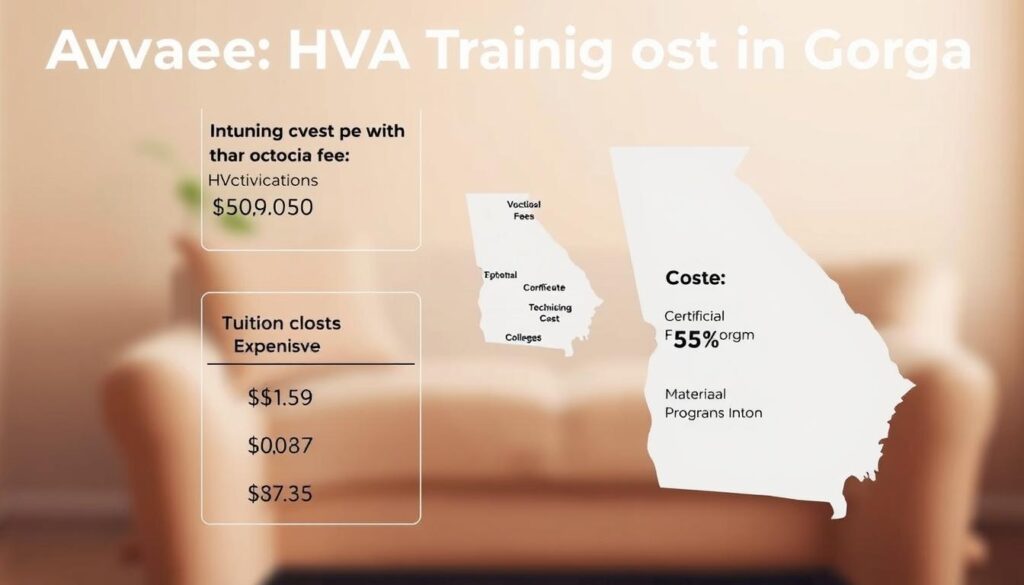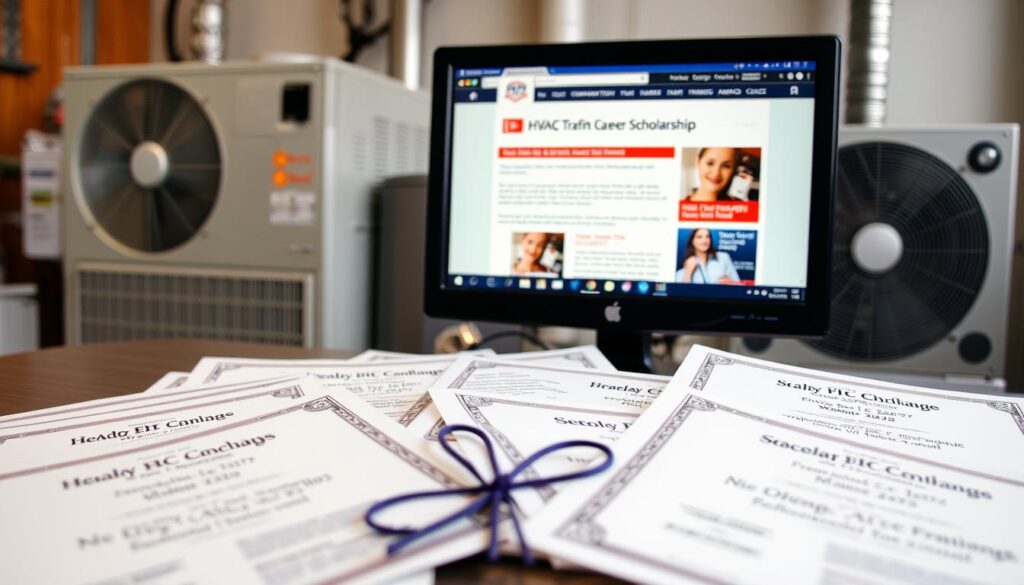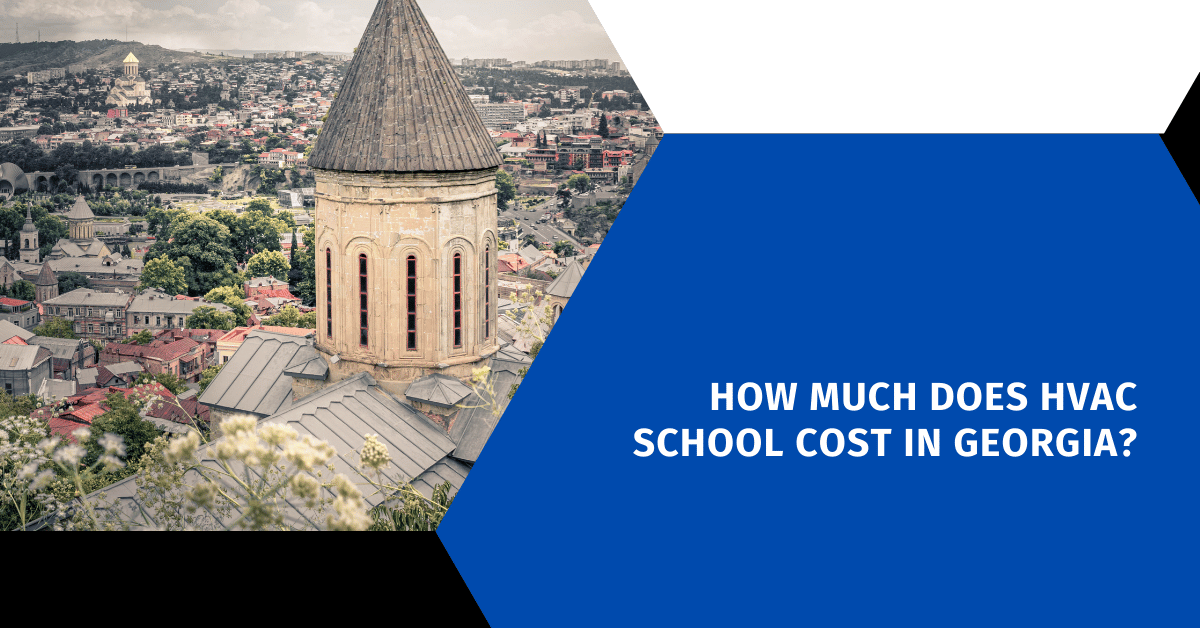Affiliate Disclosure
HVAC Guide Guys is a participant in the Amazon Services LLC Associates Program, an affiliate advertising program designed to provide a means for sites to earn advertising fees by advertising and linking to Amazon.
How Much Does HVAC School Cost in Georgia? Are you thinking about starting a career as an HVAC technician in Georgia? It’s important to know how much HVAC school costs. This knowledge is key for anyone looking into this exciting technical field.

Getting into HVAC technician training in Georgia needs careful budgeting. Most programs cost between $15,000 and $20,000. This makes it a good starting point for a stable and growing career.
When looking at HVAC school costs in Georgia, remember there’s more than just tuition. Your investment covers classroom learning, certification fees, tools, and special equipment. These are all important for success in your new career.
Key Takeaways
- Average HVAC program tuition ranges from $15,000-$20,000
- Multiple financial aid options exist for aspiring technicians
- Training duration typically spans 9-12 months
- Certification costs are separate from educational expenses
- Career opportunity makes the investment worth it
Table of Contents
Average HVAC Program Tuition Costs in Georgia
Looking into HVAC certification programs in Georgia shows different tuition prices. Knowing how much you’ll spend on HVAC trade school in Georgia is key for future technicians.
HVAC training costs change based on the program and school. Students usually spend $15,000 to $20,000 for a 9-month to 1-year program in Georgia.
Breaking Down Basic Program Costs
HVAC certification programs in Georgia have several costs:
- Tuition for core technical courses
- Lab fees and practical training expenses
- Basic classroom materials
Exploring Additional Educational Expenses
There are extra costs to consider:
- Textbooks and study materials: $300-$500
- Specialized HVAC tools and equipment: $500-$1,000
- Protective gear and uniforms
Financial Aid Opportunities
There are many ways to get financial help for HVAC trade school in Georgia:
- Federal student loans
- State-specific grants
- Technical education scholarships
- Employer tuition reimbursement programs
Invest wisely in your HVAC education – the right program can launch a successful career in technical services.
Explore Our HVAC Shop
Looking for top-rated HVAC tools, parts, and accessories? Visit our shop and find the perfect solution for your needs.
Visit the ShopHVAC Certification and Licensing Expenses
For HVAC pros in Georgia, understanding certifications is key. You’ll need to get several important credentials and licenses. Each comes with its own cost.
When planning your hvac technical college fees in Georgia, remember to include certification costs. These are vital for showing your skills and following the law in HVAC.
EPA 608 Certification Expenses
The Environmental Protection Agency (EPA) 608 certification is a must for HVAC techs. Here’s what you might pay:
- Type I Certification: $20 per exam portion
- Universal Certification: $150+ for complete testing
- Study materials: $50-$100
NATE Certification Investment
North American Technician Excellence (NATE) certification boosts your credibility. Your hvac apprenticeship costs in Georgia will include:
- Exam fees: $130-$250 per test
- Preparation courses: $100-$300
- Study guides: $50-$75
State Licensing Requirements
Georgia has specific licensing needs for HVAC pros. You’ll need to spend on:
- State examination fees: $75-$150
- License application: $50-$100
- Background check: $20-$50
Getting these certifications shows you’re serious about your career. It also makes sure you follow Georgia’s laws for HVAC work.
Duration and Program Types Available
Exploring hvac career training expenses in Georgia reveals many options. You can find programs that match your goals and budget. Georgia offers various HVAC vocational education pricing paths for different learning styles and career goals.
Your main HVAC training choices in Georgia are:
- Certificate Programs: Short-term training lasting 6-12 months
- Associate Degree Programs: Two-year educational tracks
- Apprenticeship Programs: Hands-on learning with paid work experience
Certificate programs are the most affordable option for hvac vocational education pricing in Georgia. These short courses teach basic skills for entry-level jobs. Most community colleges and technical schools offer these programs for $3,000 to $10,000.
Associate degree programs offer more in-depth training, costing $10,000 to $25,000. These two-year programs give you deeper technical knowledge and often include internships. They prepare you for advanced HVAC roles with better pay.
Apprenticeship programs mix classroom learning with paid on-the-job training. These programs last 3-5 years and often cost little upfront. Many employers support apprenticeships, making them great for those wanting hands-on experience.
Your choice depends on your career goals, financial situation, and time availability.
Think about program length, total costs, and job market chances when picking your HVAC training in Georgia.
Explore Our HVAC Shop
Looking for top-rated HVAC tools, parts, and accessories? Visit our shop and find the perfect solution for your needs.
Visit the ShopHow Much Does HVAC School Cost in Georgia?
It’s important to know how much HVAC school costs in Georgia. The cost can change a lot based on different factors.
Tuition Range Breakdown
Looking into HVAC school costs in Georgia, here’s what you might find:
- Community College Programs: $5,000 – $10,000
- Technical School Training: $10,000 – $20,000
- Private Technical Institutes: $15,000 – $25,000
Payment Plans and Options
Many HVAC training programs in Georgia have flexible payment plans:
- Monthly Installment Plans
- Employer Tuition Reimbursement
- Federal Financial Aid
- Scholarship Opportunities
Hidden Costs to Consider
There are extra costs to think about:
| Expense Category | Estimated Cost |
|---|---|
| Textbooks and Materials | $500 – $1,000 |
| Tools and Equipment | $1,000 – $2,500 |
| Transportation | $1,200 – $2,400 annually |
Pro tip: Always research multiple financing options and compare total program costs before making a decision.
Explore Our HVAC Shop
Looking for top-rated HVAC tools, parts, and accessories? Visit our shop and find the perfect solution for your needs.
Visit the ShopTools and Equipment Investment Requirements
Starting a career in HVAC means investing in quality tools and equipment. Your training in Georgia will cost more than just tuition. You’ll need essential gear for real-world challenges.
When planning your hvac technician training costs in Georgia, budget for these critical tools:
- Multimeter ($50-$200)
- Refrigeration manifold gauge set ($150-$300)
- Tubing cutter ($20-$80)
- Drill set with multiple bits ($100-$250)
- HVAC specialized hand tools ($200-$500)
Pro tip: Some technical colleges in Georgia offer tool rental programs or provide basic equipment during training, which can help reduce your initial investment.
“Investing in quality tools is investing in your future career success” – HVAC Professional Network
Your tool collection is more than an expense. It’s a professional foundation. Many Georgia HVAC training programs suggest buying a starter kit. These kits cost between $500 to $1,500 and include specialized instruments.
Smart students buy tools wisely. Start by buying what you need, look for student discounts, and choose versatile, high-quality tools. These will last you throughout your HVAC career.
Career Training Opportunities in Major Georgia Cities
Georgia has many HVAC certification programs in its big cities. These programs help aspiring technicians start their careers. Knowing about these options can guide you in choosing your HVAC path.

The cost of HVAC training in Georgia varies by city and program. There are many chances to learn and start a career in the HVAC field.
Atlanta Metro Area Programs
Atlanta is the heart of HVAC training in Georgia. You can find:
- Technical colleges with detailed HVAC courses
- Community college vocational programs
- Trade schools that focus on hands-on learning
Savannah Training Options
Savannah offers special HVAC training for those looking for technical skills. You can find:
- Short-term certification courses
- Apprenticeship programs
- Classes that fit your schedule
Augusta Educational Facilities
Augusta has strong HVAC programs to meet industry needs. You can look into:
- Accredited technical institutes
- Courses at workforce development centers
- Partnerships with local HVAC companies
Each city has its own benefits for HVAC students. Costs and programs are set to meet local needs. Your choice should match your schedule, budget, and career goals.
Explore Our HVAC Shop
Looking for top-rated HVAC tools, parts, and accessories? Visit our shop and find the perfect solution for your needs.
Visit the ShopReturn on Investment and Salary Potencial
Getting an HVAC education is a smart move for your future. The cost of hvac technical college fees georgia might seem high at first. But, the earnings you can make make it worth it. HVAC techs in Georgia have a bright career ahead with good pay and growing job opportunities.
HVAC pros in Georgia make between $35,000 and $55,000 a year. Newbies start around $32,000. Those with more experience and certifications can earn up to $65,000 or more.
- Entry-level salary: $32,000 – $40,000
- Mid-career salary: $42,000 – $55,000
- Experienced professional salary: $55,000 – $65,000+
Think about the hvac apprenticeship costs georgia. The initial cost can be paid back quickly with steady work. The HVAC field in Georgia is growing fast, with more jobs than in many other technical areas.
Your HVAC education is more than a cost—it’s an investment in a stable, high-demand career.
Several things can affect how much you earn:
- Advanced certifications
- Specialized skills
- Where you are in Georgia
- How many years you’ve been working
HVAC techs can expect 15-20% job growth in the next decade. This means a strong and rewarding career in Georgia.
Financial Assistance and Scholarship Programs

Getting into hvac career training in Georgia can be tough on your wallet. But, there are many ways to get help. These options can make your education more affordable.
Federal Aid Options
The U.S. Department of Education has many ways to help students. You can find important resources through:
- Pell Grants for low-income students
- Federal Student Loans with competitive interest rates
- Work-study programs at technical institutions
State-Specific Grants
Georgia has special help for students in technical fields. You can find:
- HOPE Career Grant for vocational programs
- Georgia Workforce Grant
- Technical College System of Georgia scholarships
Industry Scholarships
Professional HVAC groups and makers offer special scholarships. Look into:
- Air Conditioning Contractors of America (ACCA)
- Carrier Corporation scholarship fund
- Local HVAC businesses in Georgia
Pro tip: Always complete your Free Application for Federal Student Aid (FAFSA) early to maximize your chances of receiving financial assistance.
Explore Our HVAC Shop
Looking for top-rated HVAC tools, parts, and accessories? Visit our shop and find the perfect solution for your needs.
Visit the ShopComparing Different HVAC Schools in Georgia
Choosing the right HVAC school in Georgia is important. The cost of your hvac workforce development in Georgia will change based on the school. Each school has its own benefits that can affect your job training investment in Georgia.
When looking at HVAC schools, consider these key points:
- Accreditation status
- Program curriculum depth
- Job placement rates
- Total educational expenses
- Instructor expertise
Top HVAC training programs in Georgia include Atlanta Technical College, Chattahoochee Technical College, and Georgia Southern University. Each has its own program structure and cost.
Think about these important factors when choosing:
- Program Reputation: Look into the school’s connections with local HVAC employers
- Financial Investment: Compare total tuition and fees
- Training Quality: Check for hands-on learning opportunities
Your aim is to find a program that offers good value for affordable hvac workforce development costs in Georgia. It should also provide thorough training for a successful HVAC career.
Pro tip: Always check a school’s industry certifications and partnerships before you decide.
Conclusion
Starting an HVAC technician training program in Georgia is a smart move. Knowing the costs is key to planning your education. Prices vary from affordable community college to more detailed technical school, costing $3,000 to $15,000.
When you study to be an HVAC technician in Georgia, you’ll pay for tuition, certification, tools, and living costs. The first cost might seem high, but the job market in Georgia’s cities like Atlanta and Savannah is strong. HVAC techs are in demand.
Looking into financial aid and scholarships can help lower your costs. Many schools offer payment plans to ease the financial burden. This way, you can reach your career goals without financial stress.
By choosing the right path and using available resources, you can turn your HVAC education into a rewarding career in Georgia. Your dedication to learning will lead to stable jobs and future success in the HVAC field.

